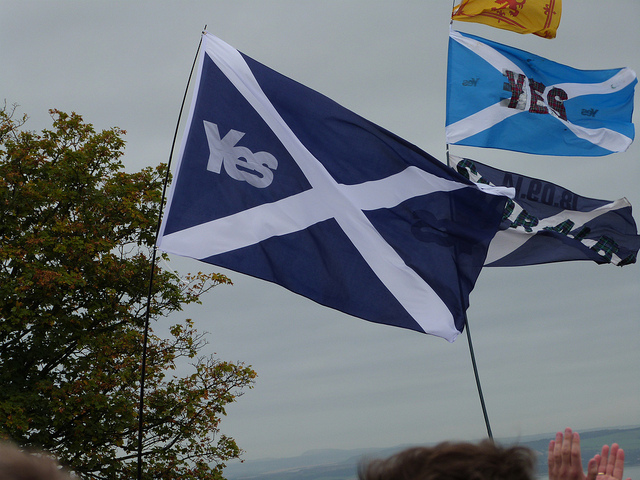With less than 10 days before the September 18 referendum on Scottish independence, the Yes campaign has forged slightly ahead in a significant public opinion poll, gaining 26 percentage points in a matter of weeks.
On the High Street in Fort William on a Saturday, the Yes campaign has a table, staffed with three volunteers handing out buttons, banners, copies of the White Paper on Scottish Independence, and brochures summarizing its main points. Campaigners are not from the Scottish Nationalist Party (SNP), and resent it when asked if they are party members.
There is not much visible evidence of a No campaign in Glasgow, Fort William, or on the Isle of Skye, places I have just visited, other than a few No posters on telephone polls. The Yes campaign has offices, lots of signs (even in business windows), and increasingly confident supporters.
U.K. Prime Minister David Cameron was at Balmoral Castle consulting with the Queen when the poll results were announced. The No campaign slogan Better Together resonates with many Scots, and there is enough fear in the air to disappoint the determined Yes voters come voting day. A new all-party U.K. proposal to give additional powers to the Scottish Parliament is expected for the last days of referendum campaigning.
The Vote No Borders campaign features a strong indictment of the Yes program. Overall the message Westminster wants Scotland to hear is that a Yes vote signals an exit, while a No vote can lead to change within the U.K. Except that a Yes vote will trigger negotiations over a range of options for an independent Scotland, including the establishment of a new relationship with the U.K.
Much of the success of the No campaign has focused on the SNP pledge to keep the British pound, at least through a transition period. Major figures have lambasted the impracticality of the proposal, including New York Times columnist and Nobel Prize-winning economist Paul Krugman. The SNP has preferred to keep its options open about the currency question.
A separate Scottish pound could be launched to replace the British pound, and it would be a practical option, economists have suggested as much.
A Scottish pound note already circulates. Scots invented modern banking, and an independent Scotland could certainly set up a central bank. To facilitate continued commerce — something in the interest of the English and the Scots — the Scottish pound could be pegged to the U.K. pound, and an exchange rate intervention agreement worked out between the two central banks. Or, like the Canadian dollar, the value of the Scottish pound could be set by exchange markets.
The Yes campaign is a citizens’ movement. It includes SNP voters and members. The Green Party supports the Yes side. Rising support for the Yes vote is attributed to Scottish Labour Party voters going over to the Yes side, though its parliamentary wing is uneasily allied with Scottish Conservatives and Liberal Democrats on the No side.
The Yes campaign is succeeding because it has turned independence into a debate about democracy. Scottish nationalism is not the issue of the campaign. Scotland is already recognized as a nation, one of the four that make up the United Kingdom. English Scots for the Yes, highly visible in the campaign, points out that the vote is not about the English and the Scots. It is about self-government.
Listen to Scots supporters of the Yes campaign and you will hear about how Scotland no longer sees itself represented in the Westminster parliament. Scotland makes up 30 per cent of the territory of the U.K. but only has about eight per cent of the population. Scots votes do not amount to much in Westminster. That matters when there is much unhappiness in Scotland about what Westminster is doing to Scotland.
Scotland and England have been growing apart. The Conservatives (who hold power in Westminster in coalition with the Liberal Democrats) hold only one of the 59 Scottish seats at Westminster. This is the party that put Margaret Thatcher front and centre, invaded the Falkland Islands, spends vast amounts on the military, privatized public services, and attacked the postwar welfare state.
The post-Thatcher U.K. no longer has the same appeal to Scots looking for answers to questions about the environment, pensions, wages, jobs, resource revenues, and rejecting the “bedroom tax.” New Labour was sufficiently tributary of Thatcherism to give the Scottish National Party life when elections were first held for the Scottish parliament in 1999.
Scots who think that the British military role in the world needs to be scaled down, that the city of London has too much power, and that privatization and cuts to social spending make no sense, have been listening to what the Yes campaign has to say, and responding to each other. Citizens have taken over the independence debate from the political parties. Everywhere in Scotland the independence question is being thrashed out, and people are changing their minds about how to vote.
Scotland was the birthplace of the industrial revolution that created the modern world economy. Now a de-industrialized Scotland is contemplating a democratic revolution.
Duncan Cameron is the president of rabble.ca and writes a weekly column on politics and current affairs. He is in Scotland to cover the referendum debate for rabble.ca.




